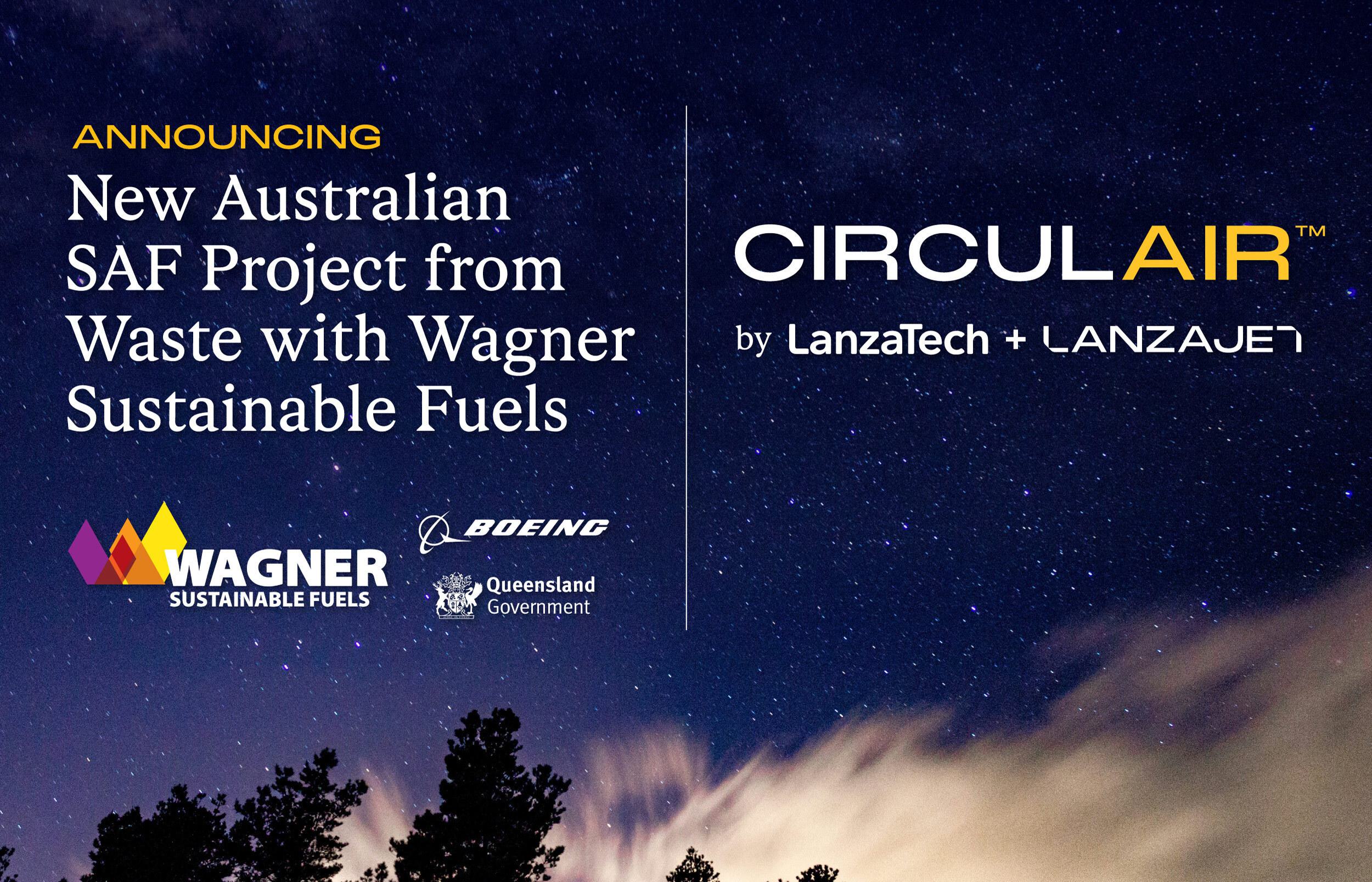LanzaTech and LanzaJet Announce New Project with Wagner Sustainable Fuels in Australia

First Project to be Developed with the CirculAir Platform, the End-to-End Commercial Sustainable Fuels Technology Solution Converting Waste Feedstocks into SAF
CHICAGO, August 19, 2024 – LanzaTech Global, Inc. (NASDAQ: LNZA), the carbon recycling company transforming waste carbon into sustainable fuels, chemicals, and materials, and LanzaJet, Inc., a leading sustainable fuels technology company and fuels producer, today announced a new project with Australia’s Wagner Sustainable Fuels to evaluate equipping Wagner’s Brisbane SAF Refinery (the “Project”) with the CirculAir™ platform. The CirculAir platform is LanzaTech and LanzaJet’s joint technology solution that converts waste carbon and renewable power into Sustainable Aviation Fuel (SAF).
In addition to securing a commercial partnership with LanzaTech and LanzaJet, the Project has received financial investments from The Boeing Company (NYSE: BA) and the Queensland Government. The Project is expected to generate a multitude of benefits, including creating jobs in Queensland, increasing domestic energy security for Australia, and helping reduce global greenhouse gas emissions from aviation.
“LanzaTech and LanzaJet look forward to providing our joint commercial solution to Wagner Sustainable Fuels to accelerate the development of a domestic Australian SAF market,” said Dr. Jennifer Holmgren, CEO of LanzaTech and Board Chair of LanzaJet. “There is enough carbon above ground to transition the 100 billion gallons of fossil fuel-derived jet fuel consumed each year to jet fuel made from recycled carbon. The flexibility of the CirculAir platform makes it possible for this Project to unlock carbon from the myriad waste-based resources available in Australia to meet local demand.”
The CirculAir process first utilizes LanzaTech’s carbon recycling technology to transform local waste streams, such as industrial emissions and municipal solid waste, into CarbonSmart™ ethanol. Then, LanzaJet’s Alcohol-to-Jet (ATJ) technology converts the ethanol into drop-in SAF. The CirculAir platform was designed to accelerate decarbonization of the global aviation industry by utilizing a variety of locally sourced waste-based feedstocks to produce the SAF volumes needed to supplant fossil fuels.
“The Wagner Sustainable Fuels project in Brisbane allows Australia to continue to stand out as a leader in Sustainable Aviation Fuel, now leveraging the CirculAir platform we co-created with LanzaTech to convert different forms of waste carbon into sustainable fuels,” said Jimmy Samartzis, CEO of LanzaJet. “The combination of LanzaJet’s leading SAF solution with the front-end of LanzaTech’s proven and commercialized carbon recycling technology makes it possible to create a domestic SAF supply in Australia using local renewable waste sources, further supporting the country’s energy security, while also working to protect its natural environment.”
Enhancing SAF production is critical for aviation to reduce its carbon footprint, as it is estimated that SAF will account for 65 – 70% of the emission reductions needed to meet the industry’s 2050 goal of net zero emissions. Historic supply constraints, high costs, and technical barriers have made it difficult for the industry to default to SAF as the primary aviation fuel source. The CirculAir platform breaks down these barriers, as the technology is able to turn a wide range of waste-based feedstocks into SAF to meet demand, and it is being adopted by a range of customers across the globe. This widespread adoption is projected to accelerate the production and economies of scale necessary to bring down the global cost of SAF.
“Our partnership with LanzaTech and LanzaJet will advance the Wagner SAF Refinery in Brisbane, accelerating the SAF industry in Australia and helping to decarbonize aviation by 2050,” said Matt Doyle, Wagner Sustainable Fuels Chief Executive Officer. “Together, these proven technologies can help us realize Australia’s first, fully integrated SAF production facility and provide a path to producing domestic fuel at scale.”